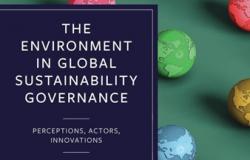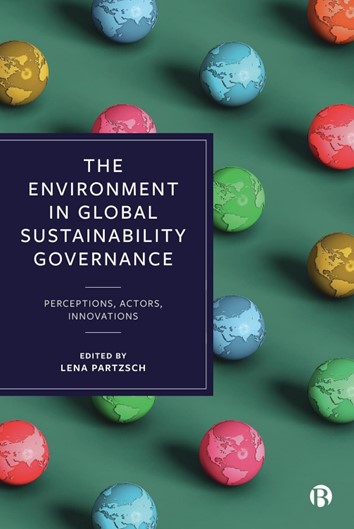Book Review - The Environment in Global Sustainability Governance: Perceptions, Actors, Innovations

The Environment in Global Sustainability Governance: Perceptions, Actors, Innovations edited by Lena Partzsch. Bristol: Bristol University Press 2024. 372 pp., £26.99 paperback 978-1529228007
Agenda 2030 and the Sustainable Development Goals (SGDs) are everywhere. They have become a global rallying cry, with organisations of all types around the world claiming to be working for one or more of these objectives. Despite their widespread endorsement, a closer examination yet suggests limited progress on many of the 17 goals and their 169 sub-targets. Particularly on the ‘green goals’, i.e. those SDGs that are directly tied to environmental issues, progress seems slow or absent. "The Environment in Global Sustainability Governance" steps in to inform this sensation with facts, offering a rich exploration of the ‘green goals’, their links, synergies and tensions with other goals, and of sustainability governance before and after implementation of Agenda 2030.
The volume with its 14 chapters introduces readers into the vast and complex landscape of single ‘green’ SDGs and SDG-bundles, including the multitude of associated treaties, negotiation processes, and outcomes. Notably, the book also pays particular attention to underdiscussed or emerging topics in political science, like ocean governance and water management on land. Furthermore, although in some chapters better than others, the authors move beyond mere descriptions and offer a deeper analysis of the mechanisms and explanatory factors of the status quo of the goals’ implementation. Along with this, the book provides a critical account of how the SDGs are framed, the contexts in which they are embedded, and the successes and failures of their implementation. A common thread is the critical discussion of the economic growth paradigm that underpins the SDG narrative, highlighting its implications for (not) achieving real progress.
 The central argument that runs through the book is the demonstration of inevitable tensions between SDGs and true environmental protection due to in-built assumptions in how the SDGs are formulated and tracked. Chapter after chapter demonstrates how the economic growth paradigm is still the general narrative, while its prioritisation is hampering real and fundamental progress on solving those problems that the SDGs aim to address. Not all chapters delve into deeper discussions of implications thereof. Yet, this is somewhat compensated for by chapters focused specifically on synergies between SDGs (Chapters 9 to 11), which offer a theme-spanning critical account of why single goals fare as they do. In addition, they add further clarity about the multiple links and conflicts between SDGs.
The central argument that runs through the book is the demonstration of inevitable tensions between SDGs and true environmental protection due to in-built assumptions in how the SDGs are formulated and tracked. Chapter after chapter demonstrates how the economic growth paradigm is still the general narrative, while its prioritisation is hampering real and fundamental progress on solving those problems that the SDGs aim to address. Not all chapters delve into deeper discussions of implications thereof. Yet, this is somewhat compensated for by chapters focused specifically on synergies between SDGs (Chapters 9 to 11), which offer a theme-spanning critical account of why single goals fare as they do. In addition, they add further clarity about the multiple links and conflicts between SDGs.
This traditional setup of an edited volume is accompanied by a rather unusual, but distinctive and applaudable feature. The book includes interviews with the chapter authors after each chapter. These interviews were prepared, conducted, and transcribed by students as part of a master’s level course taught by the editor. Though these interviews are quite brief, they add a personal dimension to the academic discourse, offering insightful perspectives on the SDGs' implementation challenges. Moreover, they complement the book's analytical rigor by further underscoring the tensions between the SDGs and genuine environmental protection.
With this, the book presents itself not only as an excellent reference book for researchers, practitioners, and interested citizens, but also as an excellent educational tool. Each chapter and interview are complemented by online available public lectures of the authors and associated discussions. These lectures were held as part of a public lecture series organised by the editor and co-facilitated by the master’s students. Testing to integrate the combination of materials into a master’s level course on sustainable development, I found it to be highly effective and successful. The multimodal and thematically diverse material engages students very well, offering them an accessible entry point into single SDGs of their interest, as well as guiding them in the development of a comprehensive and critical understanding of the SDGs that encourages and feeds deeper reflections.
Without doubt, the critical perspectives offered in the volume might initially appear pessimistic. However, they can also be seen as a refreshing and valuable assessment of the SDGs real-world effectiveness, and of the normative assumptions and perspectives which form their basis but make them problematic. This critical stance is essential for recognising the limitations of current strategies and for inspiring changes. Nonetheless, the volume could delve deeper into the critique of the economic growth imperative and the societal and political reluctance to confront the incompatibility between economic growth and true social and environmental progress. As it comes through as a core problem in many chapters, the book could have been a great place for elaborating a profounder discussion of the fundamental transformation of paradigms, dominant narratives, lifestyles, and systems that is needed to achieve sustainable development.
Notwithstanding, the volume provides a very good summary and integration of an excellently edited assortment of chapters. "The Environment in Global Sustainability Governance" is a critical, informative read for anyone interested in getting a fast yet comprehensive overview of the complexities of SDG implementation and environmental governance. Although the text's clarity is occasionally diminished by an overabundance of acronyms, on the whole, the book with its engaging language and critical outlooks encourages readers to think critically about the paths toward socio-ecological transformation, with or without the aid of (transformed) SDGs.
In summary, the volume stands as a significant contribution to the expanding body of sustainability governance literature, providing readers with comprehensive insights into the intricacies of global sustainability efforts. By delving into the complexities of SDG implementation and environmental governance, it not only informs but also stimulates a critical dialogue on the pathways towards achieving the SDGs. With its careful analysis and diverse perspectives, this book can serve as an invaluable resource for researchers, practitioners, educators, and students dedicated to navigating the complexities of sustainable development and environmental politics. Similarly, with the variety of complementary materials available to accompany the readings of the core chapters, the volume provides a distinctive and adaptable framework for educational purposes, allowing instructors to introduce and educate students on the thematic of the Sustainable Development Goals and Agenda 2030 with ease.
Carolin V. Zorell is Associate Professor in the Department of Political Science at Örebro University.


